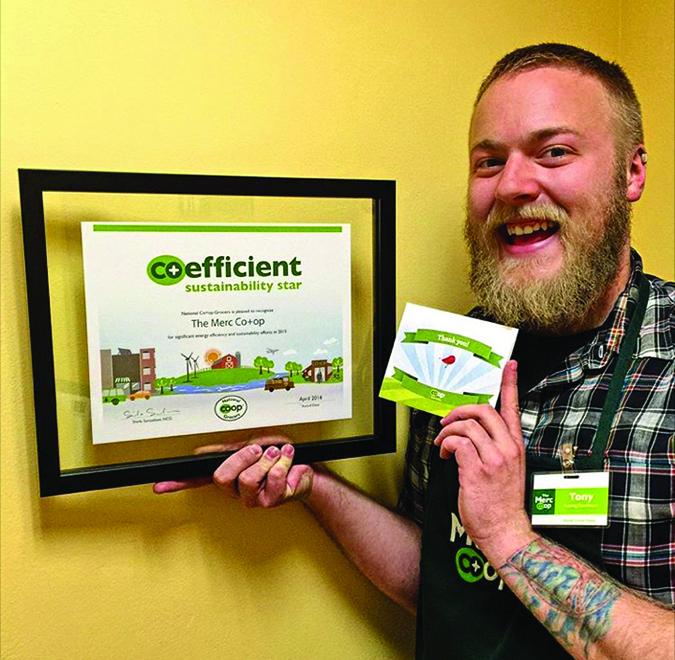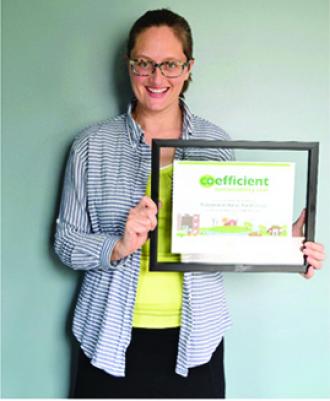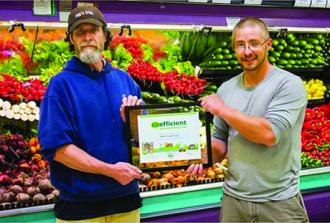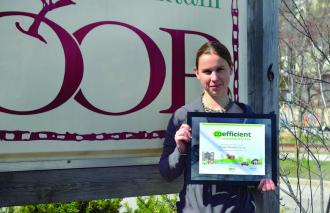National Co+op Grocers Recognizes Co+efficient Sustainability Stars




National Co+op Grocers (NCG) was pleased to present Co+efficient Sustainability Star awards to 14 co-ops in Chapel Hill, N.C. this spring.
Introduced in 2014, Co+efficient is a sustainability program designed to improve co-ops’ social, environmental, and local economic impacts. It offers a common framework for co-ops to measure their sustainability baseline, analyze strengths and opportunities, and improve sustainability results using program tools and resources.
Just two years into the program, 55 co-ops representing 104 retail and administrative locations are participating, and the results inspired NCG to recognize the co-ops that are already making a positive impact through inaugural awards.
Earning Sustainability Star recognition takes more than just excelling in sustainability pursuits. The co-ops recognized have embraced NCG’s “stronger together” philosophy in a remarkable way, by contributing and sharing the details and results of their efforts, and providing the means for other co-ops to learn and improve.
Congratulations and thank you to the co-ops listed below (in alphabetical order, along with their respective sustainability achievements). By participating in Co+efficient, these co-ops are leading the way to more robust and meaningful sustainability indicators and helping NCG to collect the data that will allow us to more effectively market our sector’s unique successes as innovators in sustainability.
Cook County Whole Foods Co-op (Minn.)
achieved the lowest energy use per square foot on record among central corridor co-ops.
East End Food Co-op (PA.)
had a 75 percent landfill diversion rate and is certified as a Bike Friendly Business.
Hunger Mountain Co-op (Vt.)
achieved an 80 percent landfill diversion rate and donated 14,000 pounds of food to charities in 2015.
Menomonie Market Food Co-op (Wis.)
diverted 35 tons of material from the landfill during their move to a new, energy-efficient store.
Monadnock Food Co-op (N.H.)
launched a Green Team in 2015 and is certified by Manomet’s Grocery Stewardship Certification.
New Pioneer Food Co-op (Iowa)
donated over 36,000 pounds of food to charities, thereby avoiding 13 metric tons of greenhouse gases.
North Coast Co-op (Calif.)
increased reuse and recycling by over 44 tons and began tracking refrigerant escape.
Ocean Beach People's Organic Food Co-op (Calif.)
logged the most renewable energy (38,000 kWh) produced by any co-op sharing data and avoided
130 metric tons of greenhouse gases by keeping food scraps out of the landfill.
Oryana Natural Foods Market (Mich.)
prevented an estimated 76 metric tons of greenhouse gases by donating 33,000 pounds of food to
charities and diverting 150,000 pounds for composting.
Seward Community Co-op (Minn.)
achieved 90 percent landfill diversion through daily waste checks in their LEED Gold–certified store.
The Food Co-op—Port Townsend (Wash.)
tied for the lowest energy use per square foot and reduced propane and water use in 2015.
They were honored by the U.S. EPA with a GreenChill award.
The Merc Co+op (Kan.)
has reduced electricity and natural gas use year-over-year for nearly 48 straight months.
The Wedge Community Co-op (Minn.)
reports 36 months of declining year-over-year energy and water use at their main location.
They have set energy reduction targets, which they are on track to meet.
Valley Natural Foods (Minn.)
has had three consecutive years of declining greenhouse gas emissions, and in 2015
achieved 80 percent landfill diversion.
Photos:
The Merc Co-op (Lawrence, Ks.) was awarded recognition for its energy-saving and sustainability efforts.
Crystal Halvorsen at Menomonie Co-op (Menonomie, Wis.) accepts an award for that co-op´s construction of a new, energy-conserving store while minimizing landfill.
North Coast Co-op (Arcata and Eureka, Calif.) also received an award for its energy and sustainability efforts.
Mary Mullally holds the award to Hunger Mountain Co-op (Montpelier, Vt.) for its innovate improvements in energy efficiency.







